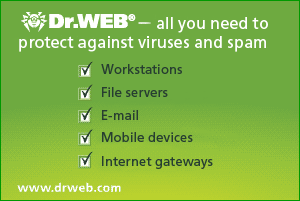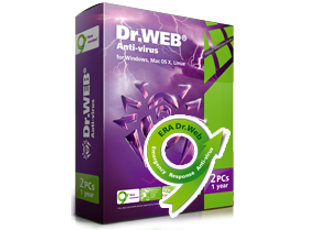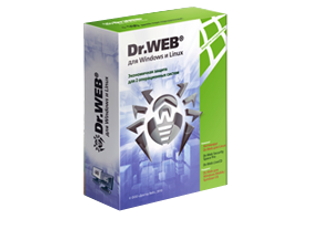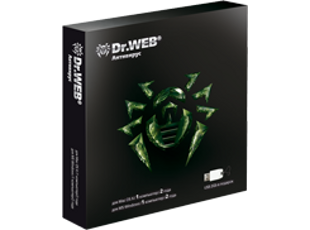Benefits of purchasing a Comprehensive protection license
- Only a Comprehensive protection license can ensure that workstations are protected from all types of Internet threats unlike anti-viruses that can only ensure partial protection.
To be exact, an anti-virus can only ensure the comprehensive protection of workstations provided that all of the channels through which viruses can infiltrate a LAN are securely closed—which is rarely the case. A file anti-virus really is guaranteed to intercept any attempt to run a virus but not attempts at infiltration, for example, if a virus arrived via e-mail as a password-protected archive, via a secured channel, or was downloaded piecemeal by a program installed by an employee in breach of corporate security policy.
To ensure the continuous workflow of all corporate business processes, it's necessary to utilize only those solutions that provide comprehensive protection. Such solutions check incoming e-mail and Internet data, restrict the access rights of company employees and visitors to various corporate network resources, and prohibit the use of removable media (e.g., flash drives).
Among the benefits of products such as Dr.Web Desktop Security Suite. Comprehensive protection is a personal built-in firewall, which, together with a traffic analysis feature, gives hackers and insiders no chance of exploiting software vulnerabilities to infiltrate a network for personal gain. Using Dr.Web Office Control (Windows only) functions to block access to files and folders and restrict access to LAN resources will make it possible to eliminate most of the ways that viruses can infiltrate a system.
- Save your money and forget about incompatibility!
Those buying comprehensive protection licenses won't have to go through different manufacturers to purchase multiple solutions that might be incompatible with each other. For instance, Dr.Web Desktop Security Suite — Comprehensive protection includes not only the anti-virus itself but also tools to protect against unauthorized access — an office control tool, an HTTP monitor, anti-spam, and a firewall. As a result, customers spend much less money than they would have spent had they purchased solutions from different manufacturers.
- The license price for Comprehensive protection is just 10% higher than that of the Anti-virus license, but the benefits it brings are immeasurably more!
Is There Life under Linux?
It is sufficiently often that you’ll hear someone say, "I don’t need an anti-virus for Linux because it’s immune to viruses."
Indeed, malicious programs written for Windows do not work in Linux-powered systems, and viruses for Linux as compared to those for Windows are extremely few. Even far fewer viruses exist for FreeBSD, Mac, and Solaris. Why defend them if the odds of catching a particular virus are very low?
The thing is that, as a rule, the list of operating systems is not limited to Linux only. Designers work on Macs, while managers use Windows because they need PowerPoint and Word. There are many products that do not exist for free systems or have free counterparts, but are deployed because of the need to cooperate with partners and customers. It is especially dangerous when Windows products run on an insecure Linux machine in emulation mode – in this case a virus can be triggered and cause an infection on the company's PCs.
As a result, a PC running under Linux and infected with a Windows virus will not really be damaged, but the company's entire network might be, and hence, its business, too.
Here are some examples of how a PC can be infected
- If Linux is used as a collaboration server, then infected files can be located on it; if users, who are not aware of the infection, use the files, their machines will become infected;
- If a virus comes via e-mail, then it may eventually be forwarded to other users.
In all these cases, the problem can be compounded by the fact that the source of viruses may not be discovered for a long time; a machine with a virus is not protected, and the network will get infected again and again. Such an unprotected machine is like a ticking time bomb, where the time of the explosion is unknown.
And one should always remember cross-platform viruses designed for specific applications. For these viruses, it does not matter which operating system the application runs under.
By the way
...some time ago, a botnet consisting of Linux servers only was discovered. Virus creators counted on the fact that no one would look for viruses in this operating system and infected only it.
Why servers need to be protected
Even if an anti-virus is installed on your workstation, your server still needs protection. Let’s analyze a situation involving an e-mail client. It would seem that if an anti-spam is installed on a workstation, then why would one be needed on the server (and vice versa)? But, the fact is that the mail flow passing through the workstation differs from the one passing through the server.
- . A user (or the programs that he agreed to install without knowing their functionality) can send and receive messages:
- directly to Internet mail servers (via SMTP protocol), if port 25 is open in the network
- to mail services like mail.ru/gmail.com — via POP3/IMAP4 protocols
- . A user (or the programs that he agreed to install without knowing their functionality) can send messages over secure channels, and the server will not be able to check them.
- . A server (or programs installed on it) can create its own mailing lists and notify senders and recipients of various events independently.
Thus, while it’s understandable that you would want to protect just a server or just a workstation, it’s not practical—protection must be installed on all of the nodes in a network.
Benefits of purchasing a centralized anti-virus protection tool
Customers normally choose to only get their workstations protected—and only from viruses (please learn more about the benefits of the Comprehensive protection). And, in most cases, they tend to purchase personal editions rather than editions for centralized protection.
You should know that by using centralized protection for all of their network nodes, you can :
- reduce the workload on local stations and speed them up accordingly;
- control the state of the protected network from anywhere — even from their homes;
- prevent end-users from configuring anti-virus protection parameters at their own discretion (e.g., disabling individual components that allegedly disturb their work), reducing the anti-virus effectiveness, or disabling it altogether;
- remotely scan the entire network or specific PCs;
- minimize the time spent on controlling the state of the anti-virus protection of all the network nodes;
- have a single center in which to collect virus health statistics on all network nodes;
- timely respond to emerging problems that would in turn reduce the risk of network infection and company financial losses caused by personnel downtimes, data losses, Internet connection breakdowns, and viral infections impacting business partners;
- save network traffic to help decrease the total cost of ownership (TCO).









